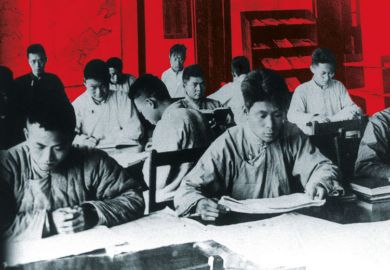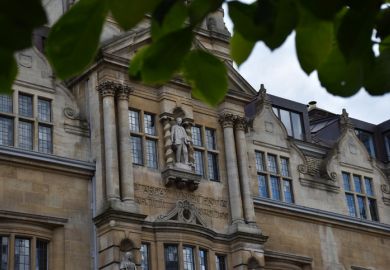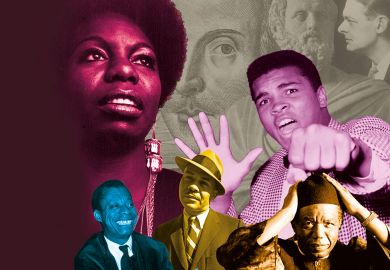In a remarkable piece in Times Higher Education on 1 September, my respected colleagues Phil Altbach and Jamil Salmi jumped to the defence of the “Western university model”, evidence-based truth and academic freedom.
The danger, it seems, is the decolonial movement and those calling for a broader, more inclusive approach to knowledge – one that also incorporates languages other than English, and diverse perspectives and fields of thought, including indigenous knowledge.
Phil and Jamil, both leading scholars of worldwide higher education, rightly quote me as criticising uniformity and exclusion in global databases, which embody “that deep Anglo-American certainty” of cultural superiority. However, to interpret such concerns as an attack on the core values and forms of the entire Western university is, to put it politely, seriously misleading. This is not a shining example of evidence-based truth.
I will address three issues. Is there a problem of global epistemic exclusion? Does decolonisation threaten science-based truth and academic freedom? And do the authors respond adequately to global inequality?
First, exclusion. English is the first language of 5 per cent of the world, but in 2018, 95.4 per cent of Web of Science and 92.6 per cent of Scopus publications were in English. Most papers in humanities and social science, written in national languages, are excluded. The Ulrich’s directory lists 10,000 journals in Chinese alone. Cultural bias is experienced by all whose native language is not English.
This matters. Web of Science and Scopus data shape university rankings. Papers with global status have greater authority, are potent in job and promotion applications and are read more widely. So why don’t we translate journal papers in every other language into global English? We have the expertise and software to do it.
Think of what we could learn from the diverse knowledge outside the current conversation. While speaking on behalf of “the West”, my colleagues do not mention the extinction of French, German and Russian as world scientific languages. Local indigenous communities have unique insights into land management and sustainable agriculture.
Second, does decolonisation threaten the Western university? Hardly. Phil and Jamil are right to say the European-American university has proven more effective than other templates. No post-colonial society wants to jettison comprehensive universities with academic disciplines, teaching, research and service. These societies retain many other Western inventions, such as the internet.
No faculty and students, even in universities nested in government, welcome violations of the freedom to think, learn and communicate. Scepticism, criticism, evidence and debate are our worldwide stock in trade. However, truth and academic freedom are not solely Western ideas. Nor do other societies have to be “freed” by forced external rule and cultural erasure before they can practise them.
There are many different roads to modernisation. Higher education across the world combines universal values and practices with diverse national-cultural traditions. It is touched by indigenous communities. A strength of the research university is its compatibility with many possible configurations of knowledge.
Arguments for decolonial reassessment and greater cultural diversity in an “ecology of knowledges”, as Portuguese scholar Boaventura de Sousa Santos puts it, are not censorious or exclusive, they are inclusive and democratic. No one would abandon the sciences. What is needed is a larger understanding of truth, and greater freedom to pursue it.
Third is my colleagues’ response to inequality. As if to prove the point about self-elected superiority, they devote 13 of their 17 paragraphs to how Western imperialism successfully imposed colonial educational models, while local cultures apparently lost the will to continue, in country after country. The long tale of conquest and obliteration is topped by British colonial administrator Thomas Babington Macaulay’s quote that “a single shelf of a good European library was worth the whole native literature of India and Arabia”. This contributes to the article’s accumulating sense of “might is right” and “there is no alternative”.
Only one paragraph states that Western universities should “re-examine their past with a critical eye”, including “ugly moments” such as “slavery, apartheid or discrimination”. Courses should become “more attuned” to the “traditionally oppressed and marginalised”.
But those “ugly moments” are continuous with the suppression of non-Anglo and non-Western perspectives today, and the lingering scent of white supremacy in the halls of power.
Decolonisation is not just about acknowledging colonial massacres and cultural genocide. It means creating new spaces for agents active on their own terms, now. Indigenous understandings are modern as well as pre-modern. Great traditions like China, India and Iran were suppressed, not extinguished. They are full of depth and vitality and will contribute much in the future.
To treat colonisation and all its outcomes as a done deal, relegating justice to the correction of history books, condones the continued neo-colonial control of higher education today. This contradicts genuine academic freedom, which must rest partly on epistemic freedom, diversity and equality of respect. It is also unrealistic.
We are not path dependent. The world is pluralising, becoming less Americanised than it was. This has freed up a deeper decolonisation. It will also change the West.
Simon Marginson is professor of higher education at the University of Oxford.
Register to continue
Why register?
- Registration is free and only takes a moment
- Once registered, you can read 3 articles a month
- Sign up for our newsletter
Subscribe
Or subscribe for unlimited access to:
- Unlimited access to news, views, insights & reviews
- Digital editions
- Digital access to THE’s university and college rankings analysis
Already registered or a current subscriber?








